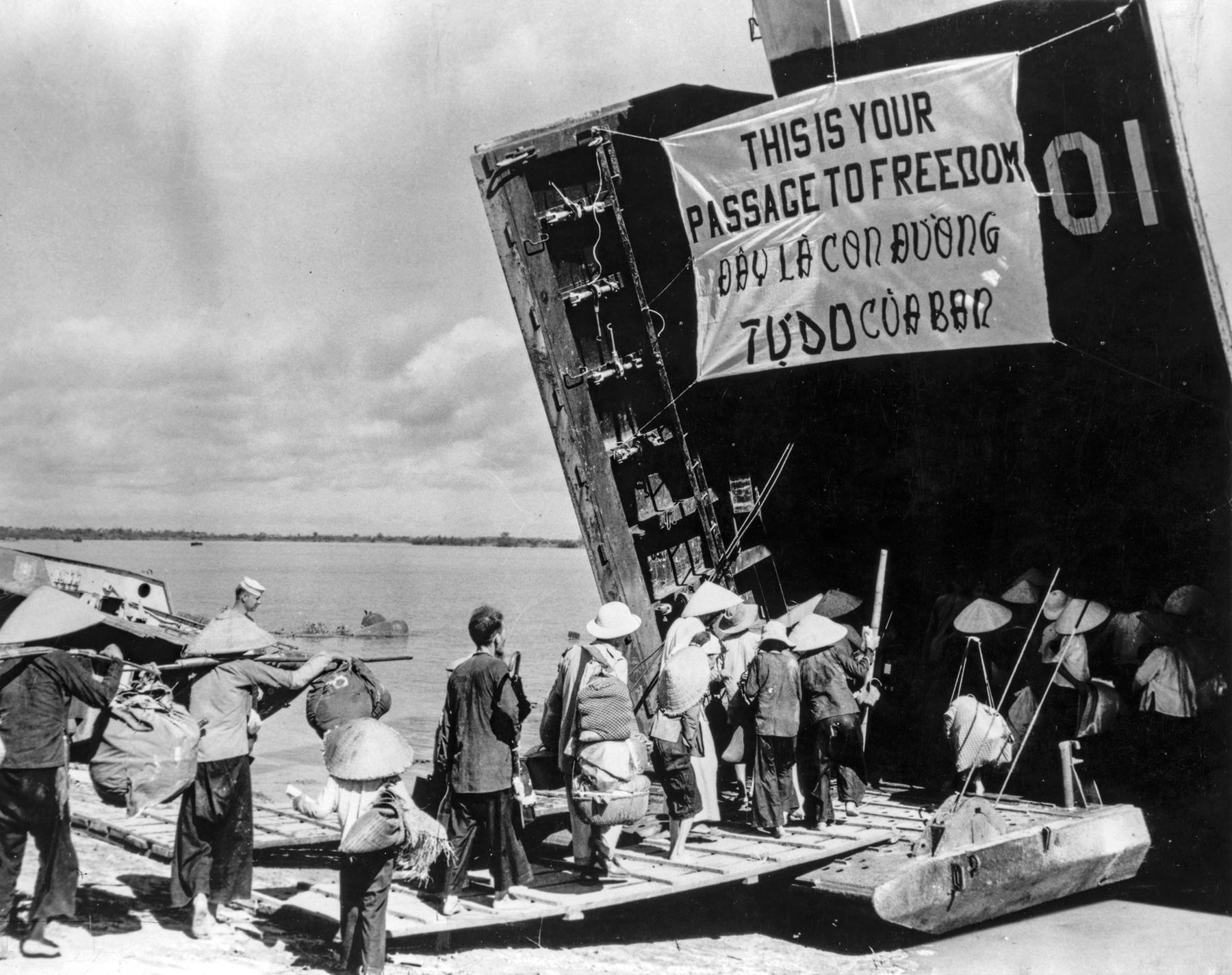Operation Passage to Freedom was a term used by the United States Navy to describe the propaganda effort and the assistance in transporting Vietnamese civilians, soldiers and non-Vietnamese members of the French Army from communist North Vietnam (the Democratic Republic of Vietnam) to non-communist South Vietnam (the State of Vietnam, later to become the Republic of Vietnam) between the years 1954 and 1955.
In the wake of the French defeat at the Battle of Dien Bien Phu, the Geneva Accords of 1954 decided the fate of French Indochina after eight years of war between the colonial French Union forces and the Viet Minh, which fought for Vietnamese independence.
The accords resulted in the partition of Vietnam at the 17th parallel north, with Ho Chi Minh's communist Viet Minh in control of the north and the French-backed State of Vietnam in the south. The agreements allowed a 300-day period of grace, ending on May 18, 1955, in which people could move freely between the two Vietnams before the border was sealed. The partition was intended to be temporary, pending elections in 1956 to reunify the country under a national government. Between 600,000 and one million people moved south, including more than 200,000 French citizens and soldiers in the French army while between 14,000 and 45,000 civilians and approximately 100,000 Viet Minh fighters moved in the opposite direction.
Operation Passage to Freedom
Propaganda poster exhorting Northerners to move South-title: "Go South to avoid Communism". Bottom caption: "Southern compatriots are welcoming Northern brothers and sisters with open arms.
My way of speaking Vietnamese is a linguistic time capsule that encapsulates the journey of 2 generations of refugees and 2 generations born in refuge.
My parents were born in Gia Kiệm, Đồng Nai, a place in South Vietnam, around 90km north-east of Saigon. They fled the country by boat in 1981 and settled in The Netherlands where I eventually got born. Even though my parents were born in the south, I grew up speaking the northern dialect(tiếng Bắc) at home. As a kid, I wondered how that was the case and why we didn't speak the southern dialect(tiếng Nam). I was told a story about a northern migration to the south in the 50's but I never got to fully understand what happened until I got older and went to Vietnam for the first time in 2017.
In the northern capital of Hanoi, I got confronted with my way of speaking; it was hard for strangers to pinpoint the region my accent came from: a softened version of the contemporary Northern dialect with a dash of Southern vocabulary, all pronounced as exact as how one would write Vietnamese. However, a somewhat broken way of speaking, sometimes maybe even hesitant since I grew up replacing unknown vocabulary with Dutch. I imagined it would be like meeting someone speaking Algemeen Beschaafd Nederlands with flemish vocabulary thrown in here and there or someone speaking Oxford English with American vocabulary.
In the South, I got to meet my father's side of the family in Gia Kiệm for the first time and went to pay my respects at my grandparents' graves. Their tombstones informed me that they were born in Ninh Bình, a northern province. I learned that they were "Bắc 54" people, northern political/religious refugees who fled to the south in 1954, fearing potential religious prosecution after the North-Vietnamese communist forces defeated the French and were able to reclaim the north. My way of speaking turned out to be the Northern dialect of 1954 that got "southernized" as my parents were born and raised in the south and then deteriorated, bastardised and mutated through the filter of Dutch culture and society into what I speak today.

Language in refuge
Shells in muscles
Mussels in shells
2 stalks of lemongrass
Smash them in mortars
Orange carrots
Cut them
In pieces
Shattered
Black pepper
White wine
Chili, red
A dash of crimson
Leaking
Into the water
Flesh washed ashore
Like shells on the beach
Are the ears, covered with sand
Once able to receive waves
and frequencies
Shells in muscles
Mussels in shells
A cluster of mouths
Shut
Clamping on solid rock
Foundations
Not to be swept
Away
By
Perpetual battering
Of
The ocean
Waves
Of
Air raids
Radio chatter
About shattered hands
Once armed
Holding
Caressing
A child
A grenade and a pin
A knife
Cutting
Gills into throats
Nets catching
Humans like fish
In marine evacuations
Where sailors
White as angels
Run!
As sirens sing
“Happy birthday…”
Mouths open
Tongues ready to eat
Sweet steam rising like
Spirits
Erect the hairs on my skin
I smile and ask
“How do you like the mussels?”
“It could use some more chili”
Silent Traumas
My parents experiencing snow for the first time after arriving at the asylum center in The Netherlands, December 1981
My grandmother with my aunts and uncles experiencing snow for the first time after arriving at the asylum center in The Netherlands, December 1981
Top: my family at a refugee center in Singapore where they had to wait 3 months to get the legal papers